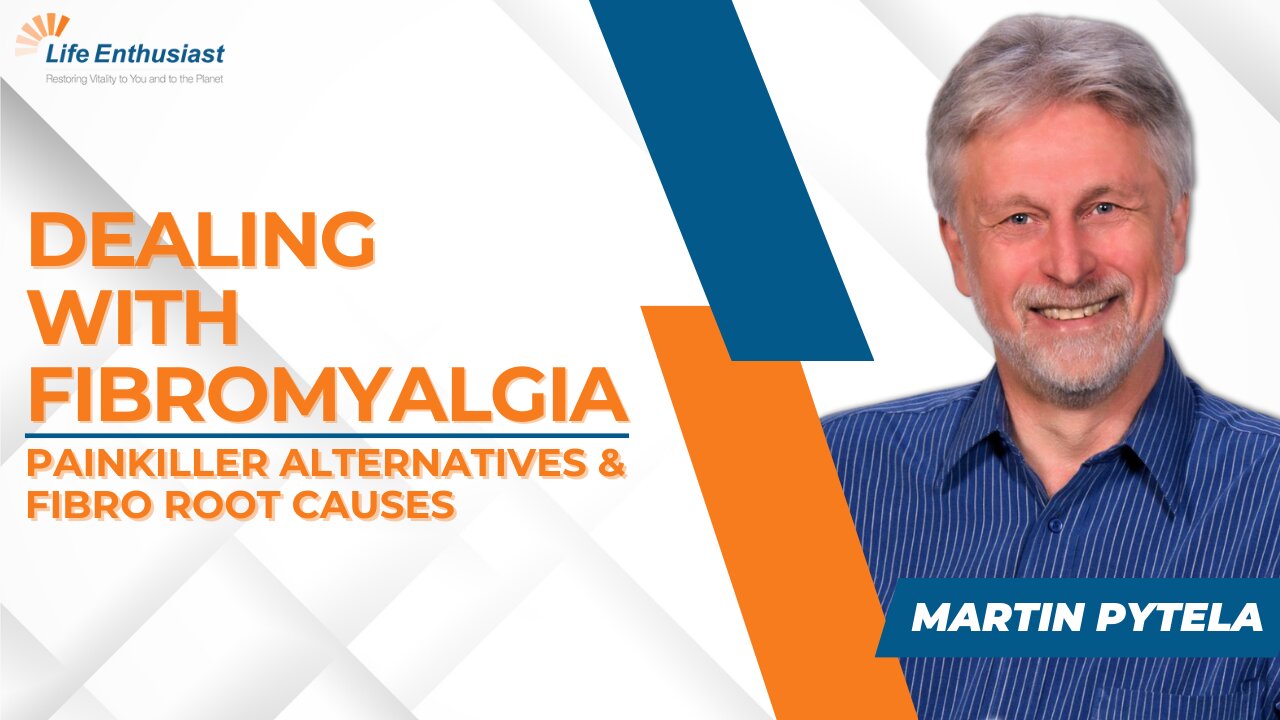Premium Only Content

Dealing with Fibromyalgia: Alternatives to Painkillers and Addressing Fibro’s Root Causes
#LifeEnthusiast #health #wellness
Fibromyalgia is a chronic condition characterized by widespread musculoskeletal pain, fatigue, and tenderness in localized areas. The exact cause is unknown, and it is often diagnosed through a process of elimination by ruling out other conditions. Traditional methods of managing fibromyalgia pain have come under scrutiny, particularly the use of pain pills. This blog post expands on insights shared in an episode of "Life Enthusiast," hosted by Scott Paton and Martin Pytela, to explore alternative approaches to managing fibromyalgia.
The Dilemma of Pain Medication for Fibromyalgia
Why Pain Clinics Are Shifting Away from Pain Pills
In the discussed episode, a viewer named Mindy shared an issue faced by many fibromyalgia patients: pain clinics are increasingly reluctant to prescribe pain pills due to the lack of definitive proof of fibromyalgia. The skepticism arises from the subjective nature of fibromyalgia symptoms, which lack visible markers on imaging or lab tests. This trend reflects a broader shift in medical practice, driven by the opioid crisis and the need to avoid addiction and dependency.
Lyrica: A Questionable Solution
Mindy mentioned that she was put on the lowest dose of Lyrica (pregabalin), a drug initially designed for epilepsy. Martin highlights that while Lyrica can help by disconnecting pain signals from reaching the brain, it doesn't address the root cause of the pain. Instead, it’s akin to covering up an indicator light on a car dashboard rather than fixing the underlying issue. Lyrica and other drugs like Cymbalta (duloxetine) are chemical blockers that reduce reactivity in the limbic system but fail to solve the fundamental problems causing fibromyalgia.
A Holistic Approach to Managing Fibromyalgia
Understanding the Root Causes
Martin Pytela emphasizes that fibromyalgia is often the result of four key factors: the presence of toxins, absence of nutrients, lack of dynamic circulation, and past trauma. These factors contribute to the overstimulation of the limbic system, which processes pain and emotional responses. Addressing these root causes can reduce the trigger-happy nature of this system, offering a more sustainable solution than medication.
Detoxification
Removing toxins from the body is a crucial step in managing fibromyalgia. This can be achieved through dietary changes, proper hydration, and possibly detoxification protocols that specifically target heavy metals, pesticides, and other harmful substances.
Nutritional Support
Proper nutrition is vital for managing fibromyalgia. This includes a balanced diet rich in anti-inflammatory foods, omega-3 fatty acids, vitamins, and minerals. Nutritional deficiencies can exacerbate symptoms, so it’s important to work with a healthcare provider to ensure adequate intake of essential nutrients.
Enhancing Circulation
Lack of dynamic circulation can contribute to the pain and stiffness associated with fibromyalgia. Regular physical activity, even gentle exercises like walking, stretching, or yoga, can improve blood flow and reduce symptoms. Techniques like massage or hydrotherapy can also promote better circulation.
Addressing Trauma
Past emotional or physical trauma can contribute significantly to fibromyalgia. Techniques such as cognitive-behavioral therapy (CBT), mindfulness meditation, and other stress-reduction strategies can help manage the psychological aspects of the condition. Addressing trauma isn’t just about mental health; it’s about reducing the physical manifestation of pain in the body.
Moving Beyond Pain Pills
Risks of Long-Term Pain Medication Use
Opioids and other pain medications can be effective in the short term but come with significant risks, including addiction and increasing tolerance. Martin underscores that the societal awareness of these risks has led pain clinics to refuse long-term prescriptions for these drugs. The vicious cycle of needing higher doses to achieve the same pain relief can lead to severe consequences, including the potential for overdose and death from illicit substances when prescriptions run out.
Empowerment Through Education
Education is crucial for those living with fibromyalgia. Understanding the condition and the various factors that contribute to it empowers patients to take proactive steps toward managing their symptoms. This includes being open to alternative treatments and focusing on long-term health rather than short-term relief.
Conclusion
Fibromyalgia management requires a comprehensive, multifaceted approach. While pain pills like Lyrica offer temporary relief, they do not address the underlying causes of the condition. By focusing on detoxification, proper nutrition, enhancing circulation, and addressing trauma, individuals can achieve more sustainable relief from fibromyalgia symptoms. Moving away from dependency on pain medication not only reduces risks associated with long-term drug use but also promotes overall well-being.
Connect With us:
Website:
https://www.life-enthusiast.com/
https://www.life-enthusiast.com/articles/product_brand/exsula-superfoods?utm_campaign=cherub&utm_medium=youtube&utm_source=exsula-superfoods
Facebook:
https://www.facebook.com/LifeEnthusiastContact
Twitter:
https://twitter.com/lifentco
Youtube:
https://www.youtube.com/user/lifentco
Rumble:
https://rumble.com/user/lifeenthusiastcoop
#LifeEnthusiast #health #wellness #podcasts #education #homeopathy
#HighQualityIngredients #NextLevelHealth #SupplementSupport #HerbalHealing #HollisticWellness #NaturalRemedies #AlternativeHealth #TraditionalMedicine #HealthJourney #WellnessSolution #HealthAndWellness #HealthyLiving #HealingPath #MartinPytela #ScottPaton
-
 LIVE
LIVE
The Dana Show with Dana Loesch
1 hour agoTRUMP TO END FUNDING FOR PBS & NPR | The Dana Show LIVE on Rumble! FRIDAY APRIL 2ND 2025
711 watching -
 LIVE
LIVE
Blockchain Basement
2 hours agoThe ULTIMATE Bitcoin Signal! (China SURRENDERS To TRUMP!)
405 watching -
 LIVE
LIVE
The Big Mig™
1 hour agoGlobal Finance Forum From Bullion To Borders We Cover It All
2,882 watching -
 10:19
10:19
SLS - Street League Skateboarding
4 days agoChris Joslin on his internal battles, writing "GMA" on his grip, Nollie Back 360 Heel's & more
3.88K1 -
 1:13:58
1:13:58
Steven Crowder
3 hours agoThe Friday Show: Trad Wives, The Walz Family, & the N-Word
201K159 -
 40:35
40:35
BitLab Academy
1 hour agoBitcoin Past $1 Million! Altcoin Ban! MSTR To Buy $84 Billion BTC!
2.22K -
 1:06:35
1:06:35
The Rubin Report
2 hours agoProtester Actually Thought She'd Outsmarted Tech CEO, Until He Asked This
25.2K23 -
 1:02:35
1:02:35
Geeks + Gamers
2 hours agoJeremy Renner Tells Marvel To F*ck Off, Thunderbolts In Theaters, GTA 6 DELAYED
53K7 -
 LIVE
LIVE
Flyover Conservatives
12 hours agoBill Belichick girlfriend, European Blackouts and 3 Tips to Grow Your Business | FOC Show
387 watching -
 1:01:56
1:01:56
Dr. Eric Berg
4 days agoThe Dr. Berg Show LIVE - May 2, 2025
19.2K3